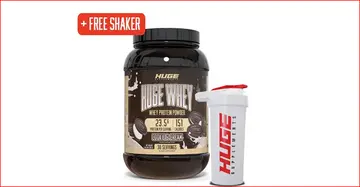Athletes who are vegan: Ranking the 15 most successful vegan athletes
Athletics
Protein powder has become a popular supplement among fitness enthusiasts and athletes looking to optimize their muscle gains. With numerous options available on the market, it's crucial to understand what to look for when choosing a protein powder that aligns with your goals.
This article will guide you through the critical factors to consider when it comes to selecting a protein powder for muscle gain.

What To Look For In Protein Powder For Muscle Gain
When selecting a protein powder for muscle gain, it's essential to consider several factors to ensure you're getting a high-quality product that aligns with your specific needs. Of course, you'll want to get your hands on the best protein powder for muscle gain. If that's the case, make sure you look at the following aspects when making your choice.
Athletes who are vegan: Ranking the 15 most successful vegan athletes
Athletics
Protein Source
The source of protein in your powder plays a vital role in its effectiveness. Look for high-quality protein sources such as whey protein, casein protein, or a blend of both.
Whey protein is derived from milk and is known for its fast digestion and absorption, making it an excellent choice for post-workout recovery. It contains a complete amino acid profile, including a high concentration of leucine, a key amino acid for muscle protein synthesis.
On the other hand, casein protein is slower digesting, providing a sustained release of amino acids, which can be beneficial during prolonged periods without protein intake, such as overnight.
Protein Content Per Serving
The protein content per serving is a crucial factor to consider. Aim for protein powders that offer around 20-30 grams of protein per serving. You’ll find many list of best protein powders for muscle gain and typically,
Top 10 best ping-pong paddles to use for good spin and control
Other Sports
This amount can vary depending on your individual needs, body weight, and activity level. Consuming an adequate amount of protein is vital for muscle synthesis and repair, so ensure the protein powder you choose provides a significant protein dose.
Low in Added Sugars and Fillers
Be cautious of protein powders that contain high amounts of added sugars, artificial sweeteners, or unnecessary fillers. These additives can contribute to unnecessary calories and may not be beneficial for your overall health.
Opt for protein powders with minimal or no added sugars and minimal ingredients. Read the labels carefully and avoid products that include excessive amounts of artificial additives.
Third-Party Testing & Quality Assurance
Ensure that the protein powder you select comes from a reputable brand that conducts third-party testing. Third-party testing verifies the quality, purity, and accuracy of the product.
Look for certifications such as NSF Certified for Sport, Informed-Choice, or GMP (Good Manufacturing Practice) to ensure that the product has undergone rigorous testing and meets high quality and safety standards.
A list of the 10 best foosball tables in the world right now
Other Sports
Digestibility
Select a protein powder that is easily digestible. Whey protein isolate and hydrolyzed whey protein are typically well-tolerated by most individuals.
These forms of whey protein have undergone additional processing to remove most of the lactose and fat, making them a suitable option for those with lactose intolerance or sensitive stomachs.
If you follow a plant-based diet, consider plant-based protein powders such as pea protein, rice protein, hemp protein, or soy protein. These options offer a complete amino acid profile and are generally well-digested.
Amino Acid Profile
A complete amino acid profile is crucial for muscle gain. Ensure that the protein powder you choose contains all essential amino acids.
Leucine, in particular, plays a pivotal role in stimulating muscle protein synthesis. Look for products that provide a high amount of leucine per serving to maximize the anabolic response in your muscles.
Protein powder has become a popular supplement among fitness enthusiasts and athletes looking to optimize their muscle gains.
What sports burn the most calories? Sports to play if you want to lose weight
Other Sports
With numerous options available on the market, it's crucial to understand what to look for when choosing a protein powder that aligns with your goals.
This article will guide you through the critical factors to consider when it comes to selecting a protein powder for muscle gain.
What To Look For In Protein Powder For Muscle GainWhen selecting a protein powder for muscle gain, it's essential to consider several factors to ensure you're getting a high-quality product that aligns with your specific needs. Of course, you'll want to get your hands on the best protein powder for muscle gain. If that's the case, make sure you look at the following aspects when making your choice. Protein Source
The source of protein in your powder plays a vital role in its effectiveness. Look for high-quality protein sources such as whey protein, casein protein, or a blend of both.
Ranked! Top 10 best indoor basketballs to hoop with right now
NBA
Whey protein is derived from milk and is known for its fast digestion and absorption, making it an excellent choice for post-workout recovery. It contains a complete amino acid profile, including a high concentration of leucine, a key amino acid for muscle protein synthesis.
On the other hand, casein protein is slower digesting, providing a sustained release of amino acids, which can be beneficial during prolonged periods without protein intake, such as overnight.
Protein Content Per Serving
The protein content per serving is a crucial factor to consider. Aim for protein powders that offer around 20-30 grams of protein per serving. You’ll find many list of best protein powders for muscle gain and typically,
This amount can vary depending on your individual needs, body weight, and activity level. Consuming an adequate amount of protein is vital for muscle synthesis and repair, so ensure the protein powder you choose provides a significant protein dose.
A list of the best basketball referee shoes in the market right now
NBA
Low in Added Sugars and Fillers
Be cautious of protein powders that contain high amounts of added sugars, artificial sweeteners, or unnecessary fillers. These additives can contribute to unnecessary calories and may not be beneficial for your overall health.
Opt for protein powders with minimal or no added sugars and minimal ingredients. Read the labels carefully and avoid products that include excessive amounts of artificial additives.
Third-Party Testing & Quality Assurance
Ensure that the protein powder you select comes from a reputable brand that conducts third-party testing. Third-party testing verifies the quality, purity, and accuracy of the product.
Look for certifications such as NSF Certified for Sport, Informed-Choice, or GMP (Good Manufacturing Practice) to ensure that the product has undergone rigorous testing and meets high quality and safety standards.
Digestibility
Select a protein powder that is easily digestible. Whey protein isolate and hydrolyzed whey protein are typically well-tolerated by most individuals.
Top 10 best ankle braces for basketball: Find out which is the best and why
NBA
These forms of whey protein have undergone additional processing to remove most of the lactose and fat, making them a suitable option for those with lactose intolerance or sensitive stomachs.
If you follow a plant-based diet, consider plant-based protein powders such as pea protein, rice protein, hemp protein, or soy protein. These options offer a complete amino acid profile and are generally well-digested.
Amino Acid Profile
A complete amino acid profile is crucial for muscle gain. Ensure that the protein powder you choose contains all essential amino acids.
Leucine, in particular, plays a pivotal role in stimulating muscle protein synthesis. Look for products that provide a high amount of leucine per serving to maximize the anabolic response in your muscles.
Conclusion
Choosing the right protein powder is crucial for supporting muscle gain and optimizing your workout results. When selecting a protein powder for muscle gain, consider the protein source, protein content per serving, amino acid profile, digestibility, presence of added sugars and fillers, third-party testing and quality assurance, and personal preferences.
Which are the best socks for tennis and why are they the best?
Tennis
Remember that protein powder should supplement a well-balanced diet that includes whole food protein sources. Consult with a healthcare professional or registered dietitian for personalized recommendations based on your specific needs and goals.
With the right protein powder in your arsenal, you can enhance your muscle-building journey and achieve your fitness objectives.
Choosing the right protein powder is crucial for supporting muscle gain and optimizing your workout results. When selecting a protein powder for muscle gain, consider the protein source, protein content per serving, amino acid profile, digestibility, presence of added sugars and fillers, third-party testing and quality assurance, and personal preferences.
Remember that protein powder should supplement a well-balanced diet that includes whole food protein sources. Consult with a healthcare professional or registered dietitian for personalized recommendations based on your specific needs and goals.
With the right protein powder in your arsenal, you can enhance your muscle-building journey and achieve your fitness objectives.